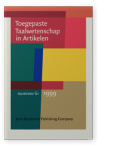Vol. 61 (1999) ► pp.21–33
Woordkennis Van Turkse Kinderen in de Bovenbouw Van Het Basisonderwijs
Een vergelijkend onderzoek bij één- en tweetalige Turkse leerlingen
In this study the breadth and depth of lexical knowledge in bilingual Turkish students in the Netherlands is compared to this knowledge in monolingual peers in Turkey. The Dutch students also performed a Dutch test on deep lexical knowledge, i.e. the Word Association Task (WAT). The results show that the bilingual children lag behind their peers in Turkey in both breadth (Peabody Picture Vocabulary Test) and depth (WAT) of lexical knowledge. Differences in deep lexical knowledge are relatively small compared to the differences in breadth of lexical knowledge. Furthermore, it turns out that the bilingual children's performance on the Dutch WAT is better than on the Turkish WAT. These findings are discussed in the context of transfer of lexical knowledge and the need for adequate vocabulary instruction to (bilingual) children.
Article language: Dutch
Cited by (2)
Cited by 2 other publications
This list is based on CrossRef data as of 21 july 2024. Please note that it may not be complete. Sources presented here have been supplied by the respective publishers. Any errors therein should be reported to them.
